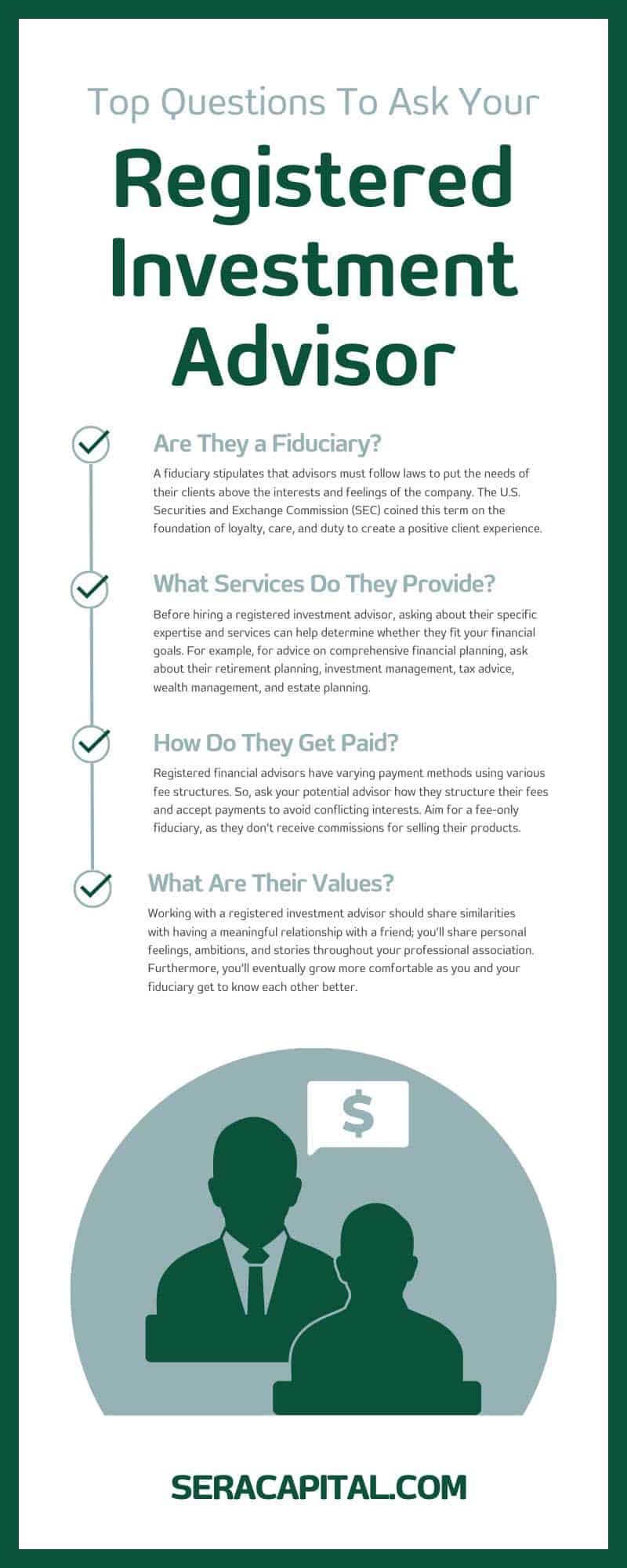Top 10 Questions To Ask Your Registered Investment Advisor

Carl E. Sera, CMT
May 23, 2023

Managing your finances and creating financial goals can be difficult, but seeking a professional’s guidance can help tremendously. Here are ten questions to ask your registered investment advisor.
Are They a Fiduciary?
Ask whether your potential registered investment advisor acts as a fiduciary when you first speak with them. A fiduciary stipulates that advisors must follow laws to put the needs of their clients above the interests and feelings of the company. The U.S. Securities and Exchange Commission (SEC) coined this term on the foundation of loyalty, care, and duty to create a positive client experience.
Additionally, a fiduciary also has a limit for expressing conflicts of interest. They must clearly state such situations, as they can limit the advisor’s professional ability to act in the client’s best interests. So, ask about their fiduciary oath, registered representative qualifications, fiduciary standard business upholding, and their fiduciary commitment to your financial planning.
What Services Do They Provide?
Before hiring a registered investment advisor, asking about their specific expertise and services can help determine whether they fit your financial goals. For example, for advice on comprehensive financial planning, ask about their retirement planning, investment management, tax advice, wealth management, and estate planning.
If you need financial advice for more specific topics, ask your advisor about their expertise in those areas. If you recently started your financial journey, see if your advisor offers financial education courses to help you understand more complex financial concepts.
How Do They Get Paid?
Registered financial advisors have varying payment methods using various fee structures. So, ask your potential advisor how they structure their fees and accept payments to avoid conflicting interests. Aim for a fee-only fiduciary, as they don’t receive commissions for selling their products.
Fee-only advisors operate on an hourly or flat rate fee structure and may charge a small percentage of the managed assets they control for you. If the cost isn’t in your favor, low-fee robo-advisors or online planning can help.
How Will They Work With You?
While working with a registered investment advisor can be a helpful and educational experience, knowing about their client engagement and interaction process should occur before your first meeting. Read their online reviews or, if possible, talk with someone you know who has hired or continues to pay for their services to learn about their communication style, systems, professionalism, and general business practices.
Furthermore, ask the advisor what material they will cover during your financial, budgeting, tax, and retirement planning meetings, how often meetings will occur, their processes, and contact methods. Asking these questions can help you determine how your financial advisor plans on working with you and if they suit your plans. Furthermore, learning more about their planning flexibility, comprehension, and setup can further determine whether they’re right for you.
What Are Their Values?
Working with a registered investment advisor should share similarities with having a meaningful relationship with a friend; you’ll share personal feelings, ambitions, and stories throughout your professional association. Furthermore, you’ll eventually grow more comfortable as you and your fiduciary get to know each other better.
So, asking them about their personal or firm’s values can help determine whether your goals align. For example, many fiduciaries follow values that include pursuing excellence, listening, integrity, making dreams happen, gratitude, and family or relationships. Hiring a registered financial advisor with similar values creates a sense of trust, community, and a meaningful desire to work together.
What Are Their Qualifications?
Before working with a registered investment advisor, ask which certifications and qualifications they have in their portfolio. Some firms only have their advisors to take the minimum course requirement, so it’s ideal to avoid these advisors as the financial industry continuously changes and must remain aware of the latest updates.
You want to search for a registered investment advisor who’s either a Chartered Financial Analyst, a Certified Financial Planner, or a Certified Public Accountant with at least a decade of experience. Lastly, you want an advisor with a clean record and no history of issues with the law or regulators. You can find public records online via professional membership groups or state government websites.
What Is Their Investment Philosophy?
Another question to ask your registered investment advisor is what their investment philosophy is. An investment philosophy is an established set of principles and beliefs that help guide an investor’s decision-making process. While it isn’t a set of laws or rules, it’s a group of strategies and guidelines that consider risk tolerance, goals, expectations, and time horizon. Some more favorable investment philosophies include growth investment, technical analysis, focusing on shares, and fundamental analysis.
Because investment is essential to overall financial success, working with an advisor that uses practical and ethical investment methods can help you feel more comfortable. Registered investment advisors should have an evidence-based, clear investment strategy that’s concise and transparent. Furthermore, they should follow guidelines for keeping costs and taxes low, plan for long-term investments, maintain professional discipline, and more.
What Are Their Liquid and Illiquid Options?
Ask your registered investment advisor about your options for liquid and illiquid funds regarding savings and retirement. Liquid savings funds are a first line of defense for personal investment prospects, such as emergencies or miscellaneous purchasing. Moreover, illiquid funds, such as retirement savings, are meant for long-period savings and aren’t accessible until the investors reach a specific age.
It’s crucial you understand your registered investment advisor’s approach and risks for long- and short-term holdings. Furthermore, your advisor must remain aware of your short-term goals and whether you must access your funds sooner rather than later without impacting your holdings.
What Are Their Investment Benchmarks?
Registered investment advisors use benchmarks to help you put your assets against other specific sectors or broader markets. Benchmarks, such as the S&P 500 Index or Dow Jones Industrial Average, are commonplace for large-capitalization stock portfolios. Tech stocks, such as the Nasdaq Composite Index, are another common benchmark.
How Often Must You Review and Update Your Plan?
Reviewing and updating your financial plan is crucial due to evolving market conditions and financial goals. What might have suited your goals a year ago may not align with your current goals. So, ask your advisors to meet with you yearly to provide financial circumstance updates and review investment returns to ensure they meet your financial objectives.
You can also choose to have your financial plan updated and reviewed semiannually if there are considerable changes in your financial goals, interest rates, income, or tax laws.
Sera Capital is a fee-only fiduciary establishment that helps individuals who seek education and investment guidance. Our financial services consultants provide assistance regarding Delaware Statutory Trusts, 1031 exchanges, 721 exchanges, and more. If you have any questions, contact our educated staff today!

Categories
Strategize Your Success
